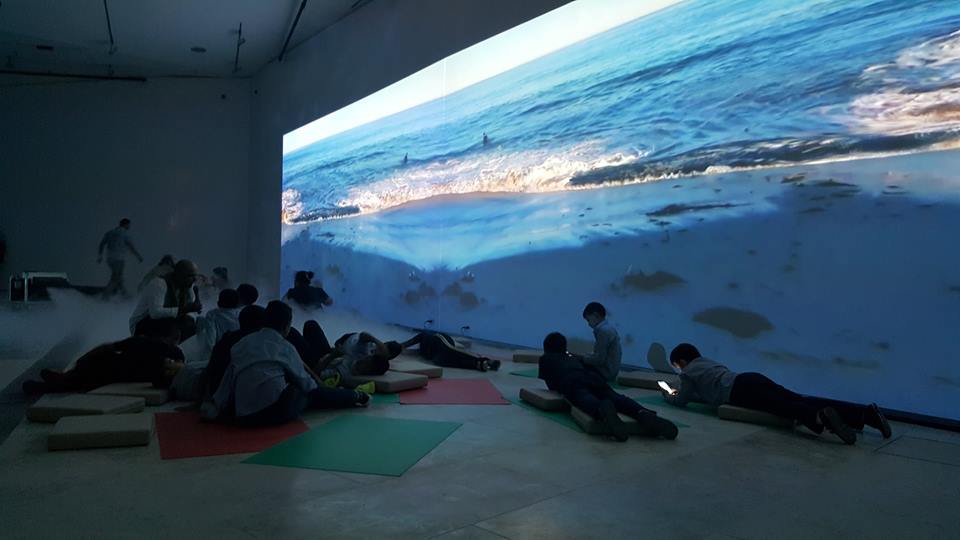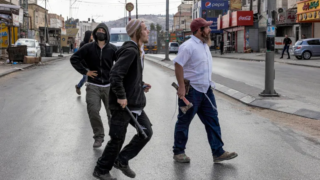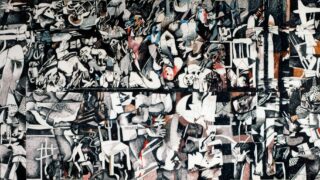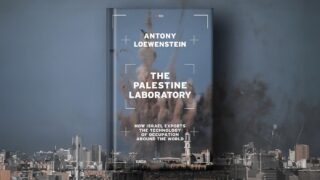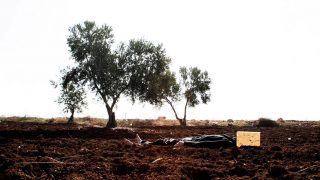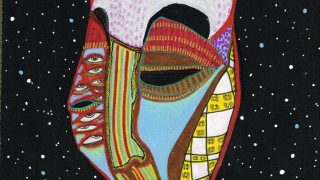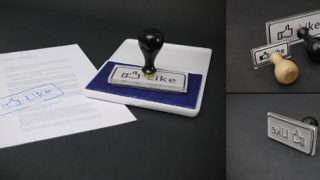For the past ten years or so, old Abu Ali sat every day in front of a round table at his son’s nursery, drinking his morning coffee. Gazing at the plants and flowers dangling from their stems, he would follow the requests of clients to his son Ali, without interfering in their search for this or that plant, just listening. From time to time, Abu Ali would stand up in front of his chair, looking left and right with his long neck like a giraffe, without any change in his rugged facial expression. Soon enough he would sit back down with his view affixed to a flower pot or some palm fronds swaying in the wind above a carnation.
His son Ali moves between the rows of plants, carrying a client’s order, assuring them that his prices were wholesale now as he planned to close down the nursery. He had agreed with the owner of the plot of land on less than 500 sq.m to relinquish his father’s protected tenancy lease so that a high-rise building could be built there. In return he would become the owner of one of the apartments in the building, and be able to live happily and comfortably without worrying about work.
Ali spits on the stems of some of the plants, expressing his disgust with the tedious labour that was not enough to make a decent living. His father’s eagle eye catches the saliva hanging from one of the flower pots and he rises and uses a paper napkin to wipe the plant clean carefully with his aged fingers, murmuring regret for his son’s heavy disregard. He returns to his seat, his neck turning this way and that, surveying the colours of the flowers and plants.
A few months later Abu Ali could be seen standing just above the spot where his chair and table used to be placed, but in the skeleton of the new cement tree that had risen in the place of the nursery. Now he stood without his coffee cup, his neck leaning against his chest, as dusty saliva drooled down his lips, not bothering to wipe his mouth clean. His gaze was fixed on the steel, cement, wood and nails strewn around the building site. The sound of his heavy breathing was drowned out by the din of digging, hammering and cement pouring.
A month later a funeral procession passed by the new building site, carrying Abu Ali to his final resting place. He was buried in a cement grave covered with a black marble slab, in front of which were placed ceramic flower pots with flowers that soon dried out and were eventually covered with the spittle of passers-by. But now Abu Ali’s hand could not reach out to wipe clean the flowers.
Everybody now knows that Ramallah is no longer the temporary capital, as it is being transformed into a big cemetery of cement trees which uproot everything that is green and tear down every building that has an iron-railed balcony or Arabesque vaulted ceilings. You walk in streets without pedestrian sidewalks since space has been claimed by buildings whose expansive walls have blown away olive and oak trees alike and have killed off the old people who planted them so long ago. Gone are the good days of old, the sweetness of the past, the fragrance of the air of yesterday, the gnarled trunks of olive trees and the rare herbs that would grow under them and only be picked to make the yellow dye for boiled eggs on “Thursday of the Dead”, mixed with the saffron carried on mules in caravans from Persia.
In this temporary State words such as Memory and Place and Heritage and Free Movement and Return have become taboos punishable by the rules of the game funded and designed in the back-rooms of the donor states. Their influence spreads everywhere like the plague, sending all the remaining exhausted old souls to their last rest alongside Abu Ali, whose final breaths were stifled by the tree of cement in whose empty trunk a café will soon serve all those clients spending their generous salaries funded by the same donors.
***
At the edge of a sidewalk of up-scale Masyoun, one of the old houses that survived with its stone walls and arched doors belonged to the pedagogue Khalil Sakakini, and was once also the sanctuary of the Poet who proclaimed that “This Sea in Mine”. Today the house shelters those few who have remained outside the system supported by the western donor beast and who have banded together to broadcast the message of the 2016 Qalandia International Art Festival that for them as well: This Sea is Mine! They stand before the poignant symbol of the festival, a jet airliner with its wings removed, reminding us that travel from the closed Qalandia Airport is impossible, movement is restricted and Return is forbidden.

To reach the venues of QI you have to navigate the cement streets of Ramallah, avoid the ever turning wheels of 3000 taxis and thousands other commercial vehicles. They all bear down with angry honking at the pedestrians who cannot afford the fare or don’t have the privilege of walking on sidewalks, for which there is no room left between the cars and trucks. Jumping from one side to the other they swear under their breath at the city engineer who forgot that cities should have sidewalks you can actually walk on or gardens that are more spacious than cemeteries. Not forgetting to reserve an unfriendly word for the real estate developer who in his greed took an extra meter here and there to expand his new building’s footprint in place of the mulberry bushes sold to him by an old man who once rested his weary bones under their green shade.
As you enter the home of Khalil Sakakini, the teacher and writer you can almost hear the anthem of the Arab revolution penned by Khalil, with his Palestinian blood and from the depths of his Christian Arabist soul:
Oh flag of the Arabs waving from the east
In the blue horizon oh flag,
Woven by mothers in the trials of the night,
Oh flag, oh flag,
For their children it is woven, how can we not sacrifice for you?
Each of your threads is a tear that dropped from their cheeks and a heartbeat in their breasts,
Oh my flag, My flag.
Beyond the gate, you hear the lilting voice of Jumana Abboud, one of the participating artists whispering from the siege of her siege, imploring the whale to not swallow the moon. Because its shining is what cleanses the water springs of the fairies and demons that haunt them, that she and her companion Issa Freij have scoured the country to unearth along with the legends of haunting and magic that some people still can remember. These are just some of the threads that Sakakini himself pulled on when he wrote the anthem of the Great Arab Revolution that burst forth from Holy Mecca a century ago.
***
A group of Palestinian artists gathers, along with artists who have come to join their Festival from indigenous communities around the world. Maybe some of them are even descendants or just extensions of the soul of the poet-teacher Khalil. Yazan Khalili, who painted the wingless airliner, Lara Khalidi the curator looking around like a lost child on the dunes of the seaside. Perhaps they just carry the spirit of Mahmoud Darwish himself from whom they borrowed his words “this sea is mine” to express their most profound humane aspirations. As Jack Persekian reminds us: “that creative poet who linked our cause to that of all oppressed peoples in the world and who humanized the Palestinian cause, making it a universal call for all those who defend the values of liberty and justice”.
They carry the universal Darwish chant on the back of his “Lonely Horse” and weave through the coloured threads that embroider the imagination of the painter Suleiman Mansour, who together with Khaled Hourani and Salim Tamari speak of their shared dream of a place for the Sea in Palestinian consciousness. The procession of artists moves like a wave towards the Palestinian Museum which has opened its doors before the world to recount the history of Palestine’s stories. Past the 1000 and 1 cafes of the capital Ramallah with narguilé smoke wafting above the meetings of NGO staffers and donors who believe they know better what is best for us, even if we don’t.
The women weave the waves hastily, so the human wave can pass Qalandia checkpoint led by the Lonely Horse that was left behind by the “Last Red Indian” in the care of the Poet Darwish, after Chief Stealth-Seattle made his final speech to the Great White Chief of the Washington Tribe. So that the Poet could lead his people, the last occupied people, back to the capital of Saladin.
Now the waves envelope the walls of Jerusalem and the horse startles at the screech of an American lady in front of an artificial grass tennis court installed deep in the Old City, just as the wave from Qalandia reaches its littered alleyways. “Don’t you want the children to have somewhere to play?” the do-gooder says with ignorant scorn to Miriam the Palestinian who reminds her that “our children don’t know what tennis is, they cannot afford a racquet or even a ball and anyhow, it doesn’t fit in either with the garbage or with the old city walls!”
The Qalandia procession continues to Al-Ma’amal Art Foundation not far from New Gate. Here they celebrate the Return to Palestine of a looted Byzantine church mosaic, uprooted in 1917 by Australian troops from under the sands near Gaza. Now its fragments have been reimagined and recreated in all its original glory tile by tile, through painstaking handiwork of Palestinian craftsmen working with the Australian artist Tom Nicholson, from Gaza and Canberra to Jericho and Jerusalem. Now safely arrived at the shores of Qalandia International, on a Sea of Art that stretches to Haifa, Beirut and Amman.
The Qalandia Sea invites you to swim its waves, along with its Lonely Horse and its wing-clipped airplane, in the company of the Returning Native and the Universal Poet, and with a bouquet of flowers courtesy of the late Abu Ali, led by a constellation of artists who inherited their ancestors’ histories and pains. Now they have replanted their stories and dreams in a Sea at Qalandia Airport, which (lest we forget) the donor States have allowed to remain closed in the face of the last occupied people. In the name of security, safety, faith and “the Only Democracy in the Middle East”, they have burned down all our symbols, from Baghdad to Damascus and Yemen, now transformed into graveyards that bear little resemblance to that cement and marble slab entombing Abu Ali, its flowers dried and wilted.
* translated from Arabic by Jadaliyya

